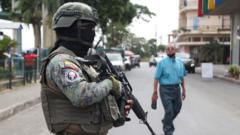**As communities grapple with the pervasive influence of gangs, efforts to broker peace and revive hope face significant challenges and generational trauma.**
### Cape Town's Gang Warfare: The Human Cost of Violence

### Cape Town's Gang Warfare: The Human Cost of Violence
**Innocent lives are shattered amid escalating gang conflicts during Cape Flats' struggles.**
---
In Cape Town's coastal region, the ongoing struggle against gang violence is taking an unbearable toll on families, with innocent victims caught in the crossfire. Four months ago, Davin Africa, a mere four years old, was shot dead, tragically becoming one of the latest casualties in the infamous Cape Flats gang wars. His father, Devon Africa, recalls how the incident changed their lives forever when the boy was caught during a violent shoot-out.
The gunfire often echoes through the townships of Cape Flats, a result of lingering socio-economic disparities rooted in apartheid-era segregation. This area, characterized by poverty and under-resourced communities, has seen overwhelming rates of gang-related violence, with police statistics revealing it as a hotspot for such crimes. Despite high-profile government initiatives like the establishment of special police units, the gangs continue to flourish and attract new members, often from impoverished backgrounds.
"Gangs provide structure and resources where the state has failed," explains Gareth Newham, an expert in security studies. They offer financial support to families, food, and even pay school fees, which complicates law enforcement’s efforts. As Pastor Craven Engel emerges as a beacon of hope, he tirelessly mediates between rival gangs, attempting to disrupt the ongoing bloodshed while addressing the root causes of addiction and generational trauma.
"In many cases, those entangled in gang life see it as their only option for survival given the lack of economic opportunities," says Engel, who also runs rehabilitation programs aimed at helping former gang members. These programs, however, face struggles in funding, limiting their outreach potential.
The cycle of violence continues to encircle the community. As Pastor Engel reflects, "Our youth must engage in this vicious cycle - either going to prison or dying." Families like the Africas have become collateral damage amidst turf wars. The community feels overwhelmed as they confront a grim reality shaped by the fallout of systemic neglect and violence.
In Hanover Park, Engel emphasizes the need for direct outreach, as he attempts to connect with both gang leaders and community members to broker a fragile ceasefire. Nonetheless, even meager attempts for peace face the threat of violence resurfacing quickly.
Engel’s work illustrates that while despair often reigns, glimmers of hope can emerge through community resilience. Nando Johnston, a young gang member, seeks to break free from his criminal lineage, inspired by Engel's programs focused on rehabilitation. "In this game there are only two options," he states matter-of-factly. "But I really do want to change direction."
The residents of Cape Flats find themselves trapped between rival gangs and ineffective policing. Past experiences have eroded trust in law enforcement, making communities wary of calling for help. As Pastor Engel poignantly notes, “Nobody is going to come to save us. Not from overseas, not from our government. We must be determined to create hope and resilience ourselves.”
In a region haunted by violence and loss, the journey toward peace and healing remains tumultuous but deeply necessary for those affected. As echoed by both community leaders and families, meaningful change will depend on addressing the intertwined issues of poverty, addiction, and systemic failure that continue to devastate lives in Cape Town.
In Cape Town's coastal region, the ongoing struggle against gang violence is taking an unbearable toll on families, with innocent victims caught in the crossfire. Four months ago, Davin Africa, a mere four years old, was shot dead, tragically becoming one of the latest casualties in the infamous Cape Flats gang wars. His father, Devon Africa, recalls how the incident changed their lives forever when the boy was caught during a violent shoot-out.
The gunfire often echoes through the townships of Cape Flats, a result of lingering socio-economic disparities rooted in apartheid-era segregation. This area, characterized by poverty and under-resourced communities, has seen overwhelming rates of gang-related violence, with police statistics revealing it as a hotspot for such crimes. Despite high-profile government initiatives like the establishment of special police units, the gangs continue to flourish and attract new members, often from impoverished backgrounds.
"Gangs provide structure and resources where the state has failed," explains Gareth Newham, an expert in security studies. They offer financial support to families, food, and even pay school fees, which complicates law enforcement’s efforts. As Pastor Craven Engel emerges as a beacon of hope, he tirelessly mediates between rival gangs, attempting to disrupt the ongoing bloodshed while addressing the root causes of addiction and generational trauma.
"In many cases, those entangled in gang life see it as their only option for survival given the lack of economic opportunities," says Engel, who also runs rehabilitation programs aimed at helping former gang members. These programs, however, face struggles in funding, limiting their outreach potential.
The cycle of violence continues to encircle the community. As Pastor Engel reflects, "Our youth must engage in this vicious cycle - either going to prison or dying." Families like the Africas have become collateral damage amidst turf wars. The community feels overwhelmed as they confront a grim reality shaped by the fallout of systemic neglect and violence.
In Hanover Park, Engel emphasizes the need for direct outreach, as he attempts to connect with both gang leaders and community members to broker a fragile ceasefire. Nonetheless, even meager attempts for peace face the threat of violence resurfacing quickly.
Engel’s work illustrates that while despair often reigns, glimmers of hope can emerge through community resilience. Nando Johnston, a young gang member, seeks to break free from his criminal lineage, inspired by Engel's programs focused on rehabilitation. "In this game there are only two options," he states matter-of-factly. "But I really do want to change direction."
The residents of Cape Flats find themselves trapped between rival gangs and ineffective policing. Past experiences have eroded trust in law enforcement, making communities wary of calling for help. As Pastor Engel poignantly notes, “Nobody is going to come to save us. Not from overseas, not from our government. We must be determined to create hope and resilience ourselves.”
In a region haunted by violence and loss, the journey toward peace and healing remains tumultuous but deeply necessary for those affected. As echoed by both community leaders and families, meaningful change will depend on addressing the intertwined issues of poverty, addiction, and systemic failure that continue to devastate lives in Cape Town.




















